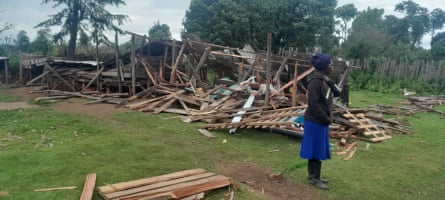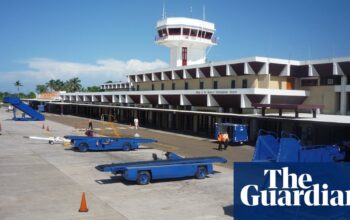Advocates for human rights are urging the Kenyan government to put a stop to the forced removal of the Indigenous Ogiek group from their traditional land in the Rift Valley.
Cyrus Maweu, the deputy director of the Kenya National Commission on Human Rights (KNCHR), has stated that we are urgently requesting an end to the current demolitions and evictions.
In recent weeks, the long-standing conflict between the Kenyan government and the community has reemerged. This was sparked by actions taken by rangers from the wildlife and forest services, who have been evicting the Ogiek people from their homes in the Mau forest. According to community leaders, around 400 houses have been destroyed, resulting in families being displaced or having to seek refuge in temporary shelters due to heavy rainfall.
Daniel Kobei, the executive director of the Ogiek Peoples’ Development Program, expressed that they are currently living in a state of extreme terror. He shared that the destruction of homes began with the use of axes, hammers, and machetes, and even escalated to burning homes. Heavy machinery is now being used to completely demolish remaining structures. This widespread destruction is causing great distress and fear among the community.
Kobei expressed concern that culturally significant homes could potentially be demolished, leading to the demise of the community.
The Ogiek community has been forced to leave the Mau forest, which is Kenya’s main water source, for many years. A legal dispute between the Ogiek and the Kenyan government resulted in a ruling from the African Court on Human and Peoples’ Rights in 2017, stating that the Ogiek have inherent rights to the Mau forest and should be allowed to live there. In a 2022 decision on reparations, the court ordered the Kenyan government to officially define and mark the boundaries of the Ogiek’s traditional land and provide them with legal ownership.
Activists and Ogiek leaders expressed concerns that the government’s actions in enforcing the significant rulings were sluggish, leaving them vulnerable to ongoing violations.
Recently, there have been a series of Ogiek evictions in the Sasimwani and Nkareta regions of the forest. These evictions were carried out in accordance with orders from Kenyan president William Ruto, who directed security agencies to remove any illegal settlers. Ruto stated that protecting the resources of the Mau forest is crucial in addressing the climate crisis, and any individuals who were removed would be given land elsewhere.
Officials have consistently stated that removing people from their homes is crucial in safeguarding the Mau ecosystem from extensive deforestation due to illicit logging and the conversion of land for agriculture. They have additionally asserted that this encroachment endangers crucial water sources that millions of Kenyans depend on.
Maweu stated that the concerns are reasonable, but this does not signify that conservation and human rights cannot exist together. The key is to find a conservation strategy that is based on human rights and does not involve exclusion.
According to rights organizations, the ongoing conflict over land rights in the Mau forest is complicated by conflicting ownership claims. The Ogiek communities, who have settled in various parts of the forest, are facing indiscriminate evictions that are challenging their land rights, as some hold titles to land within the forest that are being disputed.

According to a recent announcement, the commission responsible for protecting rights in Kenya expressed concern over the current forced removals of individuals from their homes in the forest. These evictions are occurring without proper identification and screening of authentic forest-dwelling communities.
NGOs advocating for human rights and leaders of the Ogiek community have expressed concerns about the government’s failure to follow appropriate eviction protocols. This includes notifying affected communities and providing resettlement plans. Otsieno Namwaya, the director for East Africa at Human Rights Watch, stated that the methods used in these evictions go against both Kenyan and international laws.
The leaders of the Ogiek community expressed surprise at the recent increase in evictions, following what they believed were positive discussions with environmental authorities earlier this year regarding the implementation of the African court’s ruling.
The requests for comment made to the Ministry of Environment were not answered.
Rights groups have said lasting solutions to the ongoing evictions are “urgently needed”. “Unless we get to a point where the issue is sustainably resolved, it is likely to recur in the future,” said Maweu.
Source: theguardian.com


